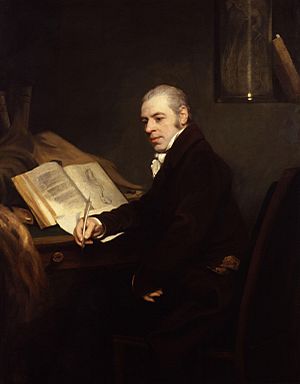Joshua Brookes facts for kids
Quick facts for kids
Joshua Brookes
|
|
|---|---|

Joshua Brookes, by Thomas Phillips, 1815
|
|
| Born | 24 November 1761 |
| Died | 10 January 1833 (aged 71) |
| Nationality | British |
| Occupation | British anatomist and naturalist |
| Known for | Fellow of the Royal Society |
Joshua Brookes (born November 24, 1761 – died January 10, 1833) was an important British scientist. He studied the human body (an anatomist) and also animals and plants (a naturalist).
Becoming a Scientist
Joshua Brookes started his studies in London. He learned from famous teachers like William Hunter. Later, he traveled to Paris, France, to learn from other top surgeons.
The Brookesian Museum
Brookes became a well-known teacher of anatomy in London. He also created his own special museum called the Brookesian Museum. This museum had a huge collection of animal and human body parts. It was used to compare how different creatures were built.
Later Years
In 1819, Joshua Brookes became a Fellow of the Royal Society. This is a very respected group of scientists. He stopped teaching in 1826 because of poor health. He tried to sell his entire museum collection, but it was too big. So, he sold it off in smaller parts. The last sale happened in March 1830. Brookes passed away on January 10, 1833, in London.
His Discoveries
Brookes was the first scientist to put the Cheetah into its own special group, or genus, called Acinonyx. He did this in 1828.
He also wrote several books and papers, including:
- A book about the anatomy of the Ostrich.
- A catalogue of his museum collection, called Brookesian Museum.
- Ideas about how to prevent Cholera, a serious illness.
- A description of a new type of Rodentia (rodent).
His Legacy
A group of small chameleons, called Brookesia, is named after Joshua Brookes.
Joshua Brookes once met Chang and Eng, who were famous conjoined twins. Brookes wrote a document saying that the twins were a "most extraordinary" natural wonder. He believed they were truly amazing and deserved public interest.
 | Laphonza Butler |
 | Daisy Bates |
 | Elizabeth Piper Ensley |

